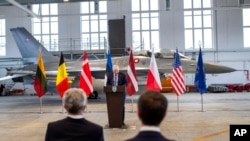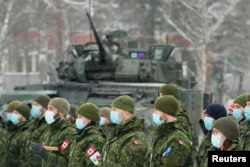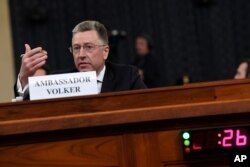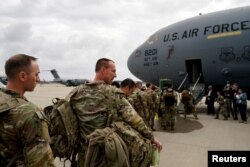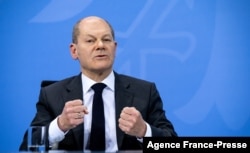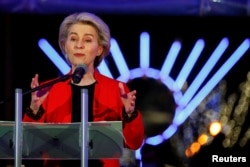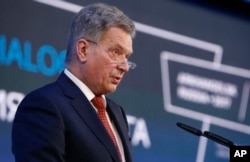Since the collapse of the Soviet Union, NATO, the post-World War II alliance forged between a victorious America and the conflict-battered countries of Western Europe, has often been dubbed a Cold War relic.
Former U.S. President Donald Trump's favorite adjective for NATO on the campaign trial was "obsolete." Two years ago, French President Emmanuel Macron declared the organization "brain-dead." NATO was mocked by other critics as an alliance in search of a mission — ridicule fanned by Western alliance officials forever churning out strategic concept papers seeking to define the alliance's post-Cold War purpose.
No explanation now seems necessary about NATO's mission, thanks to Russian leader Vladimir Putin, who appears to have handed Western powers the opportunity to revive the Western alliance, according to Ian Bremmer, an American political scientist and founder of the Eurasia Group, a political risk research and consulting firm.
"Putin single-handedly strengthening NATO," Bremmer tweeted on the announcement that alliance members are placing more forces on standby and reinforcing Eastern European countries with more ships and warplanes in response to Russia's military build-up on Ukraine's borders in what historians say is the biggest deployment of forces since 1945.
"So far, the primary geopolitical impact of Russian escalation of the Ukraine conflict has been to strengthen NATO," he added. If one of Putin's aims with the military build-up is to weaken the Western military alliance, it appears to be backfiring, Bremmer and others say.
Transatlantic differences had long dogged NATO.
"One can trace these differences back to the U.S. decision under President George W. Bush to invade Iraq, continued under President Barack Obama's 'nation-building at home' and 'pivot to Asia,' and deepened under President Trump's 'America First' policies," noted Kurt Volker, a former American envoy to NATO, a year ago in a commentary entitled "Reviving NATO Won't Be Easy."
On Russia, China and defense spending, the "United States and European allies have major, deeply embedded substantive interests and in some cases serious differences. Bridging them indeed requires a better tone. But it will also take Europe to adopt a more global and strategic approach than it has in recent years, or it will disappoint the Biden administration just as much as it did its predecessors," Volker warned.
What a difference a crisis makes! Despite disagreements over the tactics employed to deter Putin from any further military incursions into Ukraine — something Russian officials deny is being considered — many long-time NATO-watchers have praised Washington for what they say is a good job in keeping NATO allies united overall in response to Russia's threats against Ukraine.
Bremmer suspects this may have surprised the Russian leader.
"Surely not what Putin expected given U.S. unilateralism in the Afghanistan withdrawal debacle," he said, a reference to the Biden administration's decision last year to exit Afghanistan in what some NATO allies considered a badly planned and premature evacuation.
Like others, he thinks Putin may have reckoned there would be far more NATO divisions than have emerged so far, given not only lingering European frustrations over the Afghan withdrawal but also the retirement of the experienced Angela Merkel from German politics and French President Macron's unpredictability and advocacy of a European Union-based defense alliance to supersede NATO.
Benjamin Haddad, senior director of the Europe Center at the Atlantic Council, a research group in New York, told VOA recently, "Putin may think this is the right moment to act, with Germany going through a political transition and with France heading toward an election." He added, "But I do think that would be a miscalculation."
Haddad has maintained since the beginning of the year that Germany's new chancellor, Olaf Scholz, will "want to show to the Biden administration that Germany can be a good transatlantic partner," despite serious splits within his governing coalition and his own Social Democrat Party.
Last month some NATO members identified Germany as the weak link in the alliance, criticizing it for appearing not to share the same sense of urgency about Russian military threats displayed by the United States and neighboring European nations.
There remain frustrations with Germany over its refusal to send lethal weapons to Ukraine, and to block others from supplying Kyiv with German-made military equipment. And Scholz, who is trying to balance his country's membership in the Western alliance with its close ties to Russia, is still being criticized for his ambiguity over whether Berlin is prepared in the event of war to cancel the just-completed Nord Stream 2 under-sea pipeline, which will pump natural gas from Russia to Germany.
But some NATO and EU officials say Scholz is increasingly being forced into line with the U.S. and other NATO countries because of Moscow's increasingly bellicose language and aggressive behavior.
Ursula von der Leyen, who is the European Commission president and a former German defense minister, underlined Thursday that Nord Stream 2 would have to be sanctioned if Russia invades.
"Nord Stream 2 cannot be excluded from the sanctions list, that is very clear," Von der Leyen said in an interview with the Handelsblatt and Les Echos newspapers. The commission president said the future of the pipeline, which is yet to receive regulatory approval in Berlin or Brussels, would depend "on Russia's behavior."
On the core issues, NATO leaders are of one mind — they have stayed united in rejecting as non-starters the Russian demand that there be no further enlargement of the Western alliance, and they have all flatly refused to roll back the alliance's military presence in the former Soviet satellite states of Central Europe.
And they have all warned of severe consequences if the Kremlin decides to mount another attack on Ukraine in a repeat of 2014, when Russia annexed the Crimean Peninsula and used armed proxies to seize a large part of the Donbas region in eastern Ukraine, bordering Russia.
Russia's military build-up has also revived talk in Finland and Sweden of joining NATO.
Finland's president, Sauli Niinisto, this year, reiterated his country's right to join NATO if it decides to, a flat rejection of the Russian demand that NATO admit no new members. In a New Year address, the Finnish leader said, "Finland's room to maneuver and freedom of choice also include the possibility of military alignment and of applying for NATO membership, should we ourselves so decide."
Former American diplomat Daniel Fried, who served as assistant secretary of State for European and Eurasian affairs and is a former ambassador to Poland, says while the instincts of European NATO members is one of alarm, he's not getting the impression that the Europeans will cut and run and give Putin his way.
"I'm just not getting that sense," he said.
"There would be a bigger impact if all NATO countries sent equipment to Ukraine, but it's not that unusual for some member countries to do some things and others not," said David Kramer, who was an assistant secretary of State in the administration of U.S. President George W. Bush. "There have been a number of NATO operations in which not all member states participated," he added.
Hans Kundnani, a director at Britain's Chatham House, said, "It's not necessarily a problem to have different parts of the coalition, as it were, different heads of government, trying different approaches to Russia. It's not necessarily a problem if they're coordinated."
